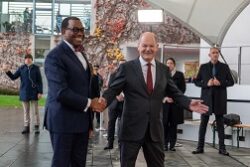The government of Germany has pledged to invest 4 billion euros in Africa’s green energy until 2030.
German Chancellor Olaf Scholz made the announcement at a press conference in Berlin after meeting African leaders and heads of international organisations including the President of the African Development Bank Group Dr Akinwumi Adesina, during the G20 Compact with Africa conference.
The Compact with Africa was initiated by Germany in 2017 during its presidency of the G20 to improve conditions for sustainable private sector investment and investment in infrastructure in Africa.
To date, 13 African countries have joined the initiative: Benin, Burkina Faso, Côte d’Ivoire, the Democratic Republic of Congo, Egypt, Ethiopia, Ghana, Guinea, Morocco, Rwanda, Senegal, Togo and Tunisia.
Scholz said the conference with African leaders was “the starting signal for stronger, reliable cooperation between Africa and Europe to realise climate-friendly energy supply based on green hydrogen.”
“Produce green hydrogen and you can rely on us as buyers,” the German Chancellor told African leaders.
“Produce green hydrogen and you can rely on us as buyers,” German Chancellor Olaf Scholz (center) told African leaders at the Compact with Africa Conference. Left: African Union Commission Chairperson Moussa Faki Mahamat; right: Azali Assoumani, President of The Union of the Comoros and Chair of the African Union
Describing Africa as “the partner of our choice”, Chancellor Scholz said African countries should benefit more strongly from their wealth of natural resources and explained that the first step of processing should take place locally, creating jobs and prosperity.
During the Compact with Africa conference, African Development Bank Group President, Dr Akinwumi Adesina pushed for stronger partnerships and investment in Africa, the world’s fastest-growing continent.
Chancellor Scholz said, “In light of the multiple global challenges, cooperation and joint work based on fair rules is more important than ever. The international organisations are key players when it comes to preserving and strengthening an international global rules-based order, in particular regarding the international economic and financial system. They can help us to foster smart globalisation in which all countries have a fair chance for sustainable development.”
“I commend Chancellor Olaf Scholz for convening the Compact with Africa Conference”, said African Development Bank Group President Akinwumi Adesina (left). Tackling climate change, Africa’s infrastructure gap, and unlocking industrial manufacturing capacities requires attracting private sector financing at scale, he added.
The African Development Bank President emphasised the importance of private sector development in Africa.Adesina said, “I commend Chancellor Olaf Scholz for convening the Compact with Africa Conference. The African Development Bank remains fully committed to the success of this initiative, especially through its focus on promoting private sector development in Africa.”
The Bank President said, tackling climate change, Africa’s infrastructure gap, and unlocking industrial manufacturing capacities requires attracting private sector financing at scale. To achieve this objective, he outlined several actions multilateral institutions must take.
“First, we must develop bankable projects and make them available to private investors.”
“Second, private sector development strategies must be aligned with the net-zero emission objective, with green investments prioritised.”
“Third, we should mitigate global risks and pool resources to optimise investment strategies, including through a platform like the Africa Investment Forum. This is an initiative that the African Development Bank and seven partner organisations created five years ago. It brings together project promoters and private and public financiers to catalyse investments on transformative projects across Africa.”
“I look forward to strengthening our strategic partnership with Germany in our drive to achieve faster economic growth and prosperity for Africa.”
The G20 Compact with Africa conference held on Tuesday to discuss several issues around the theme: Strengthening multilateral cooperation and working on a rules-based, fair, international economic and financial system.
Discussions centred around the global economy, current challenges, including high inflation and geopolitical tension; and the need to incentivise investments in global public goods, such as tackling climate change; strengthening trade in a multipolar world; simultaneously combatting labour shortages and unemployment; and strengthening multilateralism.
According to Chancellor, Scholz, “Germany wants to contribute to this agenda by enhancing global trade, improving economic resilience and assisting the reform of the international financial architecture, as well as strengthening the role of the international organisations—we need the international organisations to find multilateral solutions for global challenges.”
On the sideline of the conference, Adesina joined 40 young African entrepreneurs and innovation champions in a session titled ‘Shaping the Future with Africa—Young Entrepreneurs as Key to a Just Transition.’
The African Development Bank President announced plans to set up an executive advisory body dedicated to nurturing young African entrepreneurs and startups in Africa.
“We need to totally revamp the financial ecosystem to serve their needs,” Adesina said: “I have decided to set up a high-level youth advisory committee… to advise me and harness what is coming out of here—the experiences shared by young entrepreneurs here.”
During the conference, Adesina met with the President of the Union of the Comoros and Chair of the African Union Azali Assoumani, Nigeria’s Bola Tinubu, Senegal’s Macky Sall, President Hakainde Hichilema of Zambia, Cote d’Ivoire’s Alassane Ouattara, Kenya’s William Ruto, France President Emmanuel Macron, the Chairperson of the African Union Commission Moussa Faki Mahamat, the President of the European Commission Ursula von der Leyen, Germany’s Federal Minister for Economic Cooperation and Development Svenja Schulze, World Bank Group President Ajay Banga, International Monetary Fund Managing Director Kristalina Georgieva among others

